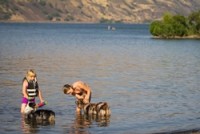Public Hearing, Comment Period on Hood River Wastewater Treatment Plant Pollution Discharge Permit
Do you kiteboard along the Hood River waterfront? Enjoy wading with your kids at the children’s beach? Or fish at the Hook? This summer, we need your help sending a strong message to state regulators: ratchet back pollution from the City of Hood River and all facilities that discharge pollution to the Columbia River. The Oregon Department of Environmental Quality (DEQ) is holding a public hearing and seeking public input on the City’s wastewater treatment plant pollution discharge permit. This is our chance to reduce pollution in the heart of Hood River popular waterfront recreation area.
Public Hearing
Tuesday, July 7, 2015, at 6:00 pm
Hood River City Hall
City Council Chambers
211 Second St.
Submit Public Comments
Deadline: July 10, 2015 at 5:00 pm
Email: ray.jackie@deq.state.or.us
Mail: ODEQ c/o Jackie Ray
800 SE Emigrant, Ste. 300
Pendleton, OR 97801
The City discharges pollution from homes, businesses, and industry directly to the Columbia River. Currently, the City’s pollution discharge pipe is just downstream of the Waterfront Park. The City proposes moving the pipe farther offshore to a deeper section of the Columbia, between Wells Island and the Hook. Pollution from the City includes bacteria, ammonia, and toxic pollutants.
This summer is your chance to weigh-in on the City’s pollution discharge permit. The DEQ and the City can do more to protect people who swim and eat fish from the Columbia River. Join us Tuesday, July 7, 2015, at DEQ’s public hearing. You can also email or mail DEQ your thoughts on why clean water matters to Hood River. To learn more about how DEQ and the City can protect our swimming beaches and fishing holes, check out Columbia Riverkeeper’s public comments and talking points.
Learn More:
- Talking Points for Public Hearing & Comments
- Columbia Riverkeeper’s Public Comments on the City of Hood River Pollution Discharge Permit
- DEQ Public Notice, Permit, and Permit Evaluation Report
Our Work to Strengthen Pollution Permits
Hundreds of facilities dump millions of gallons of pollutants into the Columbia every year. Some of that pollution is illegal, but Oregon and Washington actually allow some of this pollution through Clean Water Act permits. Many of those permits are badly outdated or contain standards that don’t protect the River or river users. Riverkeeper’s legal team reviews these permits and advocates for more stringent limits on pollution discharged to the Columbia.
Check out examples of Riverkeeper’s recent public comments:



